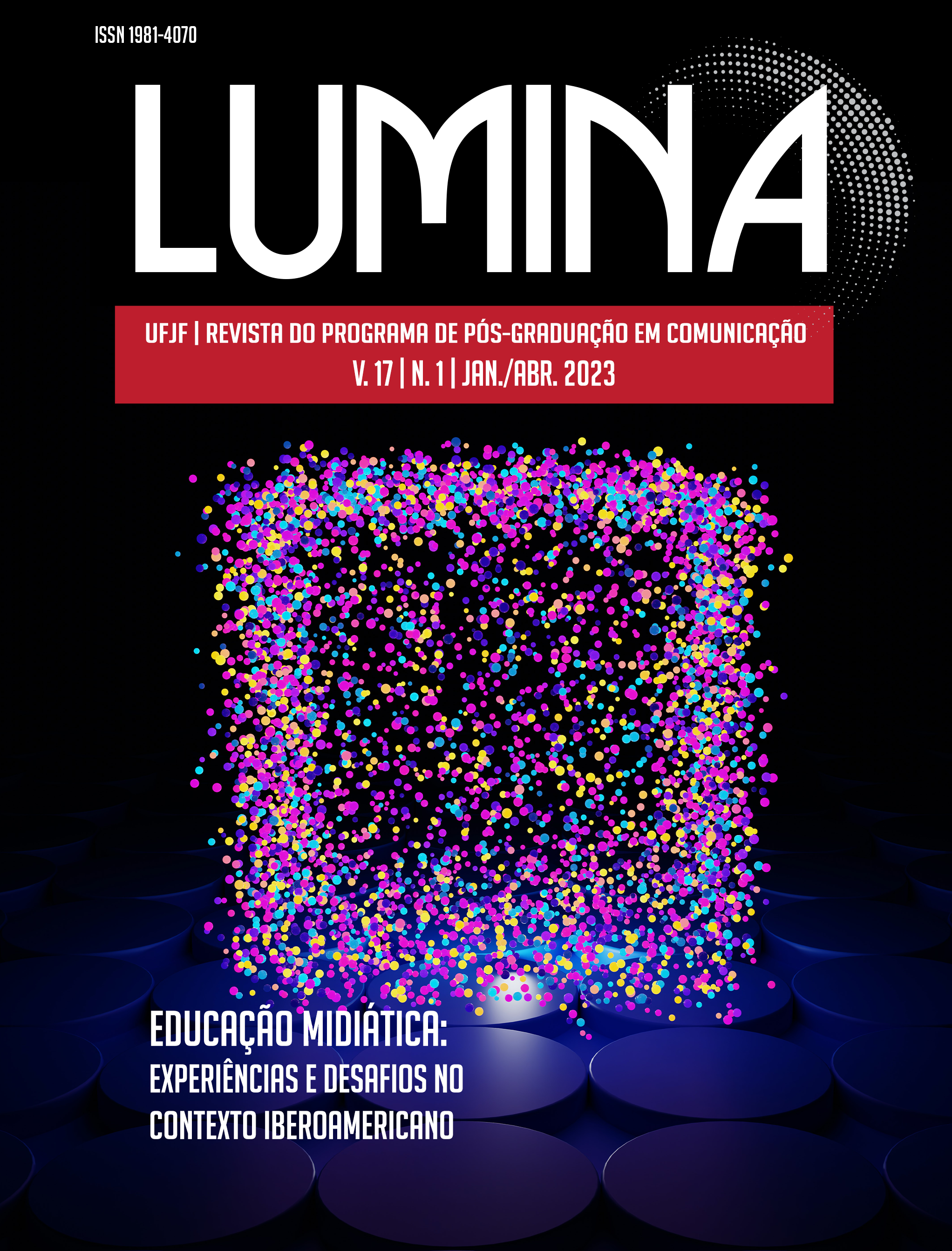Mídias digitais no desenvolvimento de competências escolares: dinâmicas dos estudantes do interior do Pará durante a pandemia de Covid-19
DOI:
https://doi.org/10.34019/1981-4070.2023.v17.40491Palabras clave:
Comunicação, Media Literacy, Internet, Covid-19, AmazôniaResumen
Este artigo tem como objetivo compreender como os alunos da Escola Estadual Macário Dantas, em São Geraldo do Araguaia, no sudeste do Pará, fazem uso da internet e das mídias digitais, e como essa utilização favorece o desenvolvimento de competências escolares. A escola situa-se na região da Amazônia Oriental que, como toda a região Norte, vivencia a falta de políticas públicas tecnodemocráticas. A partir de uma perspectiva baseada nos estudos sobre media literacy, foi realizada uma análise multiperspectiva com alunos, moradores da zona urbana e da zona rural, dos terceiros anos do ensino médio, no ano de 2021, durante a pandemia da Covid-19. Foram aplicados questionários para se compreender e comparar os indicadores estatísticos da inclusão e acessibilidade à internet e realizado um grupo focal para observar o protagonismo dos jovens nas mídias digitais e se esse protagonismo favorece o desenvolvimento de competências. As conclusões apontam que existe uma disparidade entre o acesso e o consumo da internet entre os jovens da cidade e do campo, o que fragiliza o protagonismo na cibercultura e consequentemente a participação dessa parcela da juventude nos processos de cidadania democrática.
Descargas
Citas
BAUER, T. A. O valor público da Media Literacy. Líbero, v. 14, n. 27, p. 9-22, 2011. Disponível em: <https://bit.ly/3MNCJk3>. Acesso em: 10 mai. 2022.
BORDENAVE, J. E. D. O que é participação. 8. ed. São Paulo: Brasiliense, 1994.
CASTELLS, M. Manuel Castells: “a comunicação em rede está revitalizando a democracia.”. Fronteiras do Pensamento. [Entrevista concedida a] Malu Fontes, Correio da Bahia, 11 maio 2015. Disponível em: <http://bit.ly/3meRwt8>. Acesso em: 3 out. 2021.
CASTELLS, M. O poder da comunicação. 4. ed. São Paulo/Rio de Janeiro: Paz e Terra, 2019.
CASTELLS, M. A sociedade em rede. 21. ed. Rio de Janeiro/São Paulo: Paz e Terra, 2020.
FLICK, U. (Org.). The SAGE handbook of qualitative data analysis. Los Angeles: SAGE, 2014.
JENKINS, H.; GREEN, J.; FORD, S. Cultura da conexão: criando valor e significado por meio da mídia propagável. São Paulo: Aleph, 2014.
LÉVY, P. “A questão é: como usaremos as novas tecnologias de forma significativas para aumentar a inteligência humana? Fronteiras do Pensamento. [Entrevista concedida a] Alvaro Sandra. 4 jul. 2019. Disponível em: <https://bit.ly/3m9visz>. Acesso em: 23 set. 2022.
MARTINO, L. M. S.; MENEZES, J. E. O. Media literacy: competências midiáticas para uma sociedade midiatizada. Líbero, v. 15, n. 29, p. 9-18, 2012. Disponível em: <https://bit.ly/3MMUwrm>. Acesso em: 14 jul. 2022.
MORAN, J. Autonomia e colaboração em um mundo digital. Revista Educatrix, n. 7, p. 52-57, 2014. Disponível em: <https://bit.ly/40TEkZF>. Acesso em: 19 mar. 2022.
MORGAN, D. L. Focus groups as qualitative research. Newbury Park: Sage, 1997.
POTTER, W. J. Media literacy. California: Sage Publications, 2008.
ROCHA, M. H.; JOSÉ, F. E. Cancelado: a cultura do cancelamento e o prejulgamento nas redes sociais. Youtube, 10 jun. 2021. Disponível em: <https://www.youtube.com/watch?v=Sknt6uPUIDg>. Acesso em: 18 nov. 2021.
RODRIGUES, L. A. A tecnodemocracia e as transformações sociais. 23 maio. On-line, 2018. Disponível em: <http://www.luizalbertorodrigues.com.br/?p=420>. Acesso em: 24 nov. 2021.
RUY, R. A. V. Repensando a educação escolar no contexto da cibercultura: Reflexões e potencialidades. Revista Científica Multidisciplinar Núcleo do Conhecimento, v. 11, p. 17-26, 2020. Disponível em: <https://www.nucleodoconhecimento.com.br/educacao/repensando-a-educacao>. Acesso em: 25 nov. 2022.
SALGADO, M. de M. Polarização ideológica, filtros-bolhas e algoritmos nas redes digitais. Sociotramas, On-line, 2018. Disponível em: <http://bit.ly/3Uo12qw>. Acesso em: 20 nov. 2021.
SILVA, A. F. “Cultura do cancelamento: cancelar para mudar? Eis a questão”. Revista Argentina de Investigación Narrativa, v. 1, n. 1, p. 93-104, 2021. Disponível em: <http://bit.ly/3nY0s6o>. Acesso em: 1 set. 2022..
Publicado
Cómo citar
Número
Sección
Licencia
Autores que publicam nesta revista concordam com os seguintes termos:
- Autores mantém os direitos autorais e concedem à revista o direito de primeira publicação, com o trabalho simultaneamente licenciado sob a Licença Creative Commons Attribution que permite o compartilhamento do trabalho com reconhecimento da autoria e publicação inicial nesta revista.
- Autores têm autorização para assumir contratos adicionais separadamente, para distribuição não-exclusiva da versão do trabalho publicada nesta revista (ex.: publicar em repositório institucional ou como capítulo de livro), com reconhecimento de autoria e publicação inicial nesta revista.
- Autores têm permissão e são estimulados a publicar e distribuir seu trabalho online (ex.: em repositórios institucionais ou na sua página pessoal) a qualquer ponto antes ou durante o processo editorial, já que isso pode gerar alterações produtivas, bem como aumentar o impacto e a citação do trabalho publicado (Veja O Efeito do Acesso Livre).








